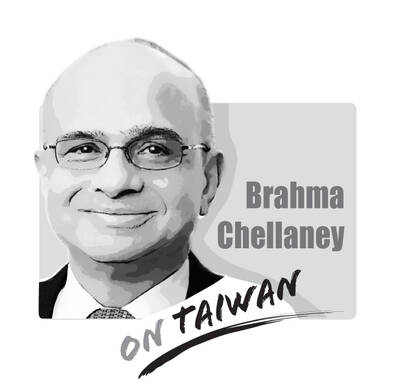Coherent, durable cross-strait strategy was one of the biggest victims of former president Chen Shui-bian’s (陳水扁) tenure. In this arena, especially compared with his wily predecessor Lee Teng-hui (李登輝) — who outmaneuvered people within his own political party as handily as he brushed off the Chinese Communist Party — Chen gradually weakened his position not only as president but also as a Democratic Progressive Party (DPP) figurehead.
President Ma Ying-jeou’s (馬英九) mandate was therefore able to extend much more deeply into cross-strait detente; the perceived alternative was four more years of asinine slogans, dumb confrontational politics and testy responses from Washington, regardless of the administrative and political reality.
In many ways, the latter part of Chen’s presidency turned out to be more damaging to his political credibility and legacy than his subsequent detention and ongoing trial. Other than demoralizing the DPP, emboldening the Chinese Nationalist Party (KMT) and triggering the reversal of many sound policies, this unfortunate period of governance helped to obscure the profound differences that separate Taiwan and China, not least the former’s steady formation of a new, separate and keenly felt national identity.
It has also helped to mask the consistently mediocre performance of the current Cabinet — from the Nero-like fiddling of Minister of Justice Wang Ching-feng (王清峰) and the infantile outbursts of Department of Health Minister Yeh Ching-chuan (葉金川) when under minimal pressure to the utter irrelevance of the Sports Affairs Council on every level.
If Kaohsiung Mayor Chen Chu’s (陳菊) recent trip to Beijing has demonstrated anything, it is this: The “opening up” of Taiwan to China is a much more complex process and carries a much greater number of possibilities — positive and dangerously negative — than the Chen era made clear.
Unlike KMT figures such as party Chairman Wu Poh-hsiung (吳伯雄) and former chairman Lien Chan (連戰) — whose regular China trips amount to little more than a desire to return to the womb and reattach to the umbilical cord — Chen Chu has helped to open a new front in the debate on how supporters of Taiwanese democracy can engage China’s grim elite and, more importantly in the longer term, ordinary Chinese.
Likewise, the sight of an enthusiastic, eloquent and intelligent woman —- and a former political prisoner — mixing with some of the most powerful regional politicians in that country defies any number of presumptions in China and elsewhere about Taiwan and Taiwanese women in particular.
If this defiance can help to awaken understanding among those Chinese who would prefer to talk about differences with other people rather than suppress them or obliterate them with munitions, then there might just be hope that “cross-strait detente” will not be the Orwellian expression to replace “status quo” prior to annexation.
The domestic angle is just as compelling. It will be interesting to see if Chen Chu’s groundbreaking visit and dignified reception will temper the obsequiousness of KMT officials and force them to behave in a manner more respectful of the grassroots voters they purport to represent.
Taiwan’s victory in the World Baseball Softball Confederation Premier12 championship is an historic achievement. Yet once again this achievement is marred by the indignity of the imposed moniker “Chinese Taipei.” The absurdity is compounded by the fact that none of the players are even from Taipei, and some, such as Paiwan catcher Giljegiljaw Kungkuan, are not even ethnically Chinese. The issue garnered attention around the Paris Olympics, yet fell off the agenda as Olympic memories retreated. “Chinese Taipei” persists, and the baseball championship serves as a reminder that fighting “Chinese Taipei” must be a continuous campaign, not merely resurfacing around international
Taiwan Semiconductor Manufacturing Co (TSMC) appears to be encountering some culture shock and safety issues at its new fab in Arizona. On Nov. 7, Arizona state authorities cited TSMC for worker safety violations, fining the company US$16,131, after a man died in May. The Arizona Division of Occupational Safety and Health released its six-month investigation into the fatality and cited TSMC for failing to keep the workplace free from hazards likely to cause death or serious harm. At about the same time, the chip giant was also sued for alleged discriminatory hiring practices favoring Asians, prompting a flurry of debate on whether TSMC’s
This month, the National Health Insurance (NHI) is to implement a major policy change by eliminating the suspension-and-resumption mechanism for Taiwanese residing abroad. With more than 210,000 Taiwanese living overseas — many with greater financial means than those in Taiwan — this reform, catalyzed by a 2022 Constitutional Court ruling, underscores the importance of fairness, sustainability and shared responsibility in one of the world’s most admired public healthcare systems. Beyond legal obligations, expatriates have a compelling moral duty to contribute, recognizing their stake in a system that embodies the principle of health as a human right. The ruling declared the prior

US president-elect Donald Trump is inheriting from President Joe Biden a challenging situation for American policy in the Indo-Pacific region, with an expansionist China on the march and threatening to incorporate Taiwan, by force if necessary. US policy choices have become increasingly difficult, in part because Biden’s policy of engagement with China, including investing in personal diplomacy with President Xi Jinping (習近平), has not only yielded little but also allowed the Chinese military to gain a stronger footing in the South China Sea and the Taiwan Strait. In Xi’s Nov. 16 Lima meeting with a diminished Biden, the Chinese strongman signaled little